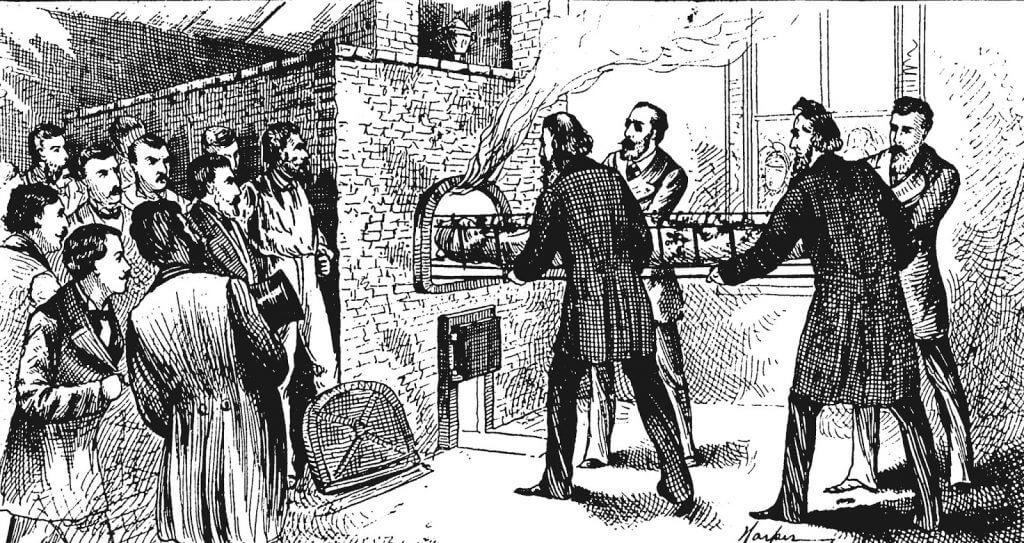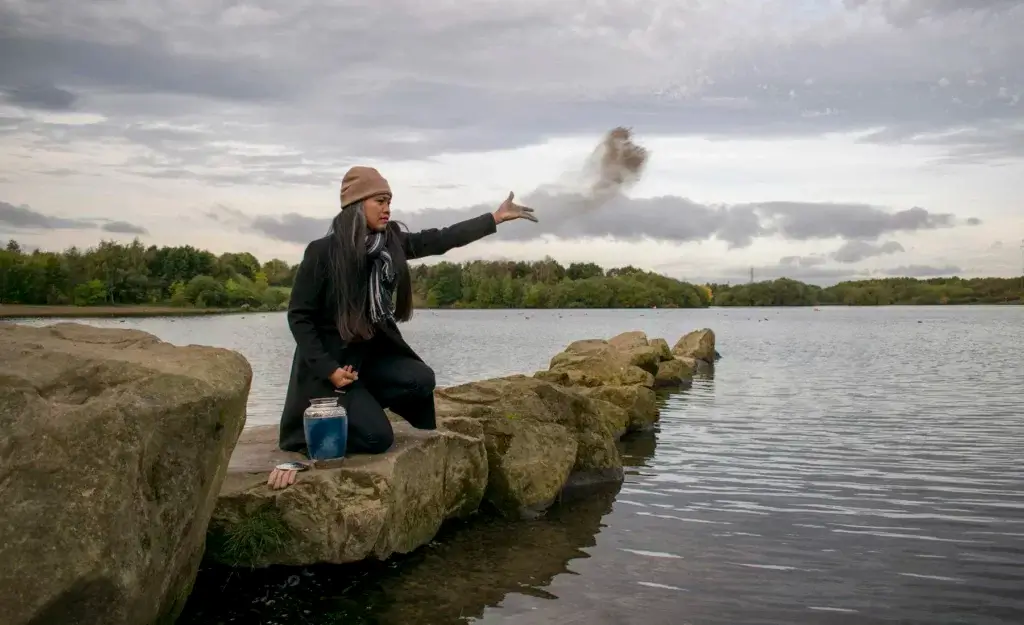The Bible doesn’t explicitly discuss the morality of cremation or scattering a loved one’s ashes. Many Christians and Christian churches believe that such practices are not in violation of any religious principles.
If you’re considering your own funeral or planning the funeral of a loved one, you may wonder, “What does the Bible say about cremation? How about the scattering of ashes?” Whether you’ve followed Jesus and studied the Bible your whole life or have never stepped foot in a church, it’s normal to wonder about spiritual matters when thinking about death.
The Bible doesn’t speak explicitly on cremation, and the scriptures don’t say anything about scattering the deceased’s ashes. But the Bible does have a lot to say about death and what comes next.
A History of Cremation
Some historians and archaeologists believe cremation has been going on for thousands and thousands of years – it’s nothing new. Scholars agree cremation probably began around 3000 BC in Europe and the Near East. We saw cemeteries dedicated for cremation pop up in Hungary and northern Italy during the Bronze Age. Many Greeks adopted it as a standard burial custom around the time of Homer, and by the time of the Roman empire, it was widely practiced.

The biggest motivator for cremation early on was war. With so many slain soldiers, it made more sense from an effort and health standpoint to simply burn the bodies.
Because the Romans and Greeks regularly practiced cremation, many early Christians rejected cremation in order to set themselves apart from their pagan practices.
Around 400 AD, both Christians and non-Christians primarily practiced earth burial. Many Christians were heavily influenced by Paul’s words in 1 Corinthians:
Or do you not know that your body is a temple of the Holy Spirit within you, whom you have from God? You are not your own, for you were bought with a price. So glorify God in your body.
1 Corinthians 6:19-20 (ESV)
Christians saw their bodies as precious to God, so why burn them? This thought heavily influenced Europe and much of the surrounding area. Many early Christians were also hesitant to cremate because of the doctrine of bodily resurrection. If our bodies are to rise again at the return of Jesus, what happens if they were cremated (more on this below)?
Flash forward to the late 1800s in Europe and we see a movement back to cremation, influenced by Queen Victoria’s surgeon who was concerned with the hazardous health potential of deceased bodies. He felt it was in the community’s best interest to cremate. This thought spread across the ocean to the United States where today around half of all deaths in the US were handled through cremation.
A History of Scattering Ashes
The ceremony of scattering ashes of a deceased love one began when the ancient Greeks started cremating the dead. It doesn’t seem like it held any deep meaning – it just made sense – especially within the military.
As cremation rise, fell, and rose again, so did the practice of scattering ashes. It seems to scholars that some people groups viewed it as a spiritual practice, while others did it out of necessity.

As Hinduism came to prominence in the Middle East and South Asia, cremation and the scattering of ashes became more common as well. Hindus hold that cremation and the scattering of ashes is a sacred tradition that signifies the final separation of soul from body. Most Hindu families scatter the ashes of a loved one in a sacred body of water.
Today, many families cremate and scatter the ashes of loved ones in a symbolic fashion. Some take a trip to scatter them or hold small ceremonies (often separate from the funeral) to celebrate and remember.
The Bible on Cremation and Scattering Ashes
So what does the Bible have to say about cremation and scattering ashes? The Bible doesn’t say much.
In the Old Testament, we see the traditional burials of Sarah (Genesis 23:1-20), Rachel (Genesis 35:19-20), and Rebekah’s nurse (Genesis 35:8). And we see the cremation of Saul and his sons (1 Samuel 31:11-13). But none of these stories are prescriptive on how we should handle the dead today.
In the New Testament, we see the body of Jesus buried in an above-ground tomb after He carried the cross to His crucifixion. We see Jesus raise two people from the dead: the son of the widow in Nain (Luke 7:11-17) and Lazarus (John 11:38-44). But neither of these stories are clear about whether either of them would have been buried or cremated.
Isn’t the Body a Temple?
We already mentioned 1 Corinthians 6:19-20 where Paul tells us our bodies are a temple and are to be used to glorify God. But does this truth mean we shouldn’t be cremated, as some of the early Christians thought?
Ultimately, our bodies are a temple due to the indwelling of the Holy Spirit. God makes His home in us. But when we die, the Bible is clear that our souls pass on. Our bodies are simply flesh. Without the in-dwelt Holy Spirit, the body is just a body. Sure, it should be respected, but the fact that it was once a temple holds little-to-no bearing on how it should be treated after death.
Does Cremation Interfere with the Physical Resurrection of the Body?
Some Christians may wonder, “If my physical body will also resurrect at the return of Christ, I shouldn’t cremate it, right?” This is a logical thought, but we know that our new Heavenly bodies will be radically changed and glorified like the body of the risen Jesus. The Bible is clear that these will be new bodies:
But someone will ask, “How are the dead raised? With what kind of body will they come?” How foolish! What you sow does not come to life unless it dies. When you sow, you do not plant the body that will be, but just a seed, perhaps of wheat or of something else. But God gives it a body as he has determined, and to each kind of seed he gives its own body. Not all flesh is the same: People have one kind of flesh, animals have another, birds another and fish another. There are also heavenly bodies and there are earthly bodies; but the splendor of the heavenly bodies is one kind, and the splendor of the earthly bodies is another. The sun has one kind of splendor, the moon another and the stars another; and star differs from star in splendor.
So will it be with the resurrection of the dead. The body that is sown is perishable, it is raised imperishable; it is sown in dishonor, it is raised in glory; it is sown in weakness, it is raised in power; it is sown a natural body, it is raised a spiritual body.
1 Corinthians 15:35-44
“But our citizenship is in heaven. And we eagerly await a Savior from there, the Lord Jesus Christ, who, by the power that enables him to bring everything under his control, will transform our lowly bodies so that they will be like his glorious body.
Philippians 3:20-21
The Bible Teaches that Death is Not the End
Ultimately, the Bible doesn’t speak much about funeral practices. And I think that’s telling. Death is not the end. Those who follow Jesus will not taste or see death, for Jesus has defeated it. Just as He died in the ninth hour and rose on the third day, we will rise again as well. We will die, but we will immediately pass on to be fully united to Christ. I think the Bible is clear that what’s coming in the future for Christians is far more important than what we leave behind.
Is It Okay to Cremate and Scatter the Ashes of a Christian?
Yes, it’s okay to cremate and scatter the ashes of a Christian. Whether burial or cremation is the best route for you or your loved one is a deeply personal decision. Consider the wishes of the family and friends of the loved one. But it will not make any difference at the resurrection whether a person’s body has been buried or cremated.
We look forward to the day when we dwell in the presence of God in our new, heavenly bodies.





